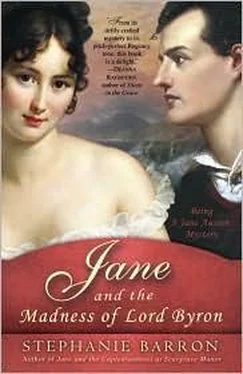“I am entirely of your opinion, Miss Austen!” her ladyship cried, and slipped her arm through mine. “But the gentlemen will not see it; they abuse the Princess as a jade and a joke. Can any woman stand mutely by, and allow such indignities to go unanswered?”
We conversed a little longer in this vein; and I could not help but be forcibly put in mind of Lord Harold Trowbridge, as I listened to his niece’s sentiments. She marshalled her arguments with logic and care, as Lord Harold had been wont to do; and I thought it very likely her husband’s success in Parliament owed much to the cold judgement of his primary auditor — his wife.
“And Lady Oxford is just such another,” Desdemona concluded as we achieved the far end of the Marine Parade, and halted to observe some boats putting into the waves. “Swithin is in the right — he is always in the right: her conduct goes beyond what is pleasing, even in so great a lady, in the constant parade of her amours . But she should not have behaved so ill, I am sure, had her husband not been so weak. He practically abandoned her to Sir Francis Burdett, her first lover, and when one is left entirely alone in the house for a week with so eloquent a man, I am sure one cannot be blamed for the consequences.”
The consequences, as even I was aware, ran to several children — members of what were unkindly called the “Harleian Miscellany,” in a nod to their uncertain parentage. Desdemona lost me here; only friendship could excuse her support of Lady Oxford, and I had no such tender feelings to persuade me from what was right. Mona’s frankness, however, absolved my conscience of any pang; I might be as inquisitive as I chose.
“Her ladyship is a great admirer of Lord Byron, I collect?”
Desdemona smiled. “That young man has been practically living in her pocket all winter, if you will credit it! And he is barely of age, Miss Austen! And she is old enough to be his mother — or very nearly! It is one of the on-dits of Town; and we are forced to treat the liaison as the merest commonplace, tho’ he has been staying at Eywood — the Earl’s estate in Herefordshire, you know — since before Christmas, and has only exchanged it for London once the Countess quitted the place. He has settled in lodgings in St. James’s, but hardly dares show himself out-of-doors, for fear of meeting Caro Lamb.”
“I had hoped that lady might have learnt resignation,” I said. “But still she pursues Lord Byron?”
“For a wonder! I should not be capable of enduring such ridicule as she wins — for all the world is talking of it, you know. Lady Melbourne, Caro’s mother-in-law, is no friend to her; she has taken up with Byron herself, and serves as the poet’s maternal counselor — all from vanity, of course, at succeeding where her daughter-in-law has failed! I wonder that William Lamb can bear it — to have both wife and mother enthralled by the same swaggering boy, nearly ten years his junior, and admitted on terms of cordiality in his own home!”
“Lady Melbourne, the intimate friend of her son’s rival,” I gasped. “How does Lady Caroline bear it?”
“Seethingly,” Desdemona said. “She communicates with her mother-in-law solely by writing. They inhabit separate floors of Melbourne House; and such scenes as must occur upon the stairs I do not like to think! But I feel some pity for Caro Lamb, tho’ she has brought her ruin upon herself; she is become the most tragic sort of spectacle — hardly anyone receives her now. One cannot predict what she is capable of — one cannot know what she may do. Violence , perhaps, to herself or others. Emotion has carried her beyond the bourne of reason.”
“And yet,” I observed, reverting to our earlier subject of conversation, “Lady Oxford is Byron’s current inamorata — and Lady Oxford is welcome everywhere.”
Desdemona smiled. “Not quite everywhere. The Regent will not receive her, on account of her support for the Princess; and so Byron, too, is given the cut direct when he descends upon Brighton.”
“I am glad to know that man has suffered some rejection, at least!”
But the Countess was no longer attending. Her eyes had narrowed, in gazing at a particular boat just then thrusting out to sea. It was a sailing vessel, not at all large as such things go: but a single mast and sail, and what my Naval brothers should have called a jib — I might almost have ventured abroad in it myself. It had been some years since I had rowed my nephews in a little boat about Southampton Water. But Desdemona was not lost in contemplation of the boat, pretty tho’ it was, with its gay sails and dark red paint.
“And so the Devil is come to Brighton,” she murmured softly. “And I do mean Devil, Miss Austen. That is Byron himself — just there, springing into the boat with a quickness surprising in one who is lame — George, Lord Byron, about to set sail. Is there not something poetic about the scene?”
She spoke a simple truth. There was the boat: bright-hulled, bucking on the waves like a horse impatient for a gallop; and the broad-shouldered, lithe young man with the windswept black locks, his deft fingers working at the ropes. A timeless image; beautiful in its clean lines and brilliant colours, its implicit promise of freedom —
“My dear,” called the Earl of Swithin, from where he stood a little advanced from us in company with Henry, “I believe we should beg our friends’ pardon for detaining them so long, and enquire whether they might dine with us, before the Assembly tomorrow?”
But Desdemona was deaf to her lord.
I was scarcely more attentive myself. For a young boy had raced, barefoot, across the sand directly for Lord Byron’s boat. His blond hair was cropped short, in curling waves over nape and forehead; his nankeen breeches were so loose on his wiry frame that they were lashed to his waist with a stout leather belt; and his shirt — a rough linen one with flowing ruffles and sleeves, that put me strongly in mind of a Gypsy’s — was so blowsy as to suggest it might better have fitted Byron himself. A local urchin, I thought, whose intent was to earn a copper or two by helping his lordship heave his vessel into the sea.
But the lad was too late — his lordship was already afloat — and in desperation, the boy surged out into the waves, hailing the vessel in a high, excited accent, the linen shirt ripping free of his breeches in the brisk wind.
Byron turned and fixed his gaze upon his pursuer’s countenance — and his own visibly darkened. As Desdemona and I observed the scene, his lordship’s beautiful mouth curled in contempt and hatred. “Little Mania!” he shouted. “You may go to the bottom and welcome, for all I care!”
And he let out his sail with an impatient twitch of line, willing the little boat to surge forward, away from the boy.
“How cold the water must be,” I murmured. “I have only assayed it once, in Charmouth — and that, from a bathing machine — I am sure it is far colder in the midst of the ocean, against one’s sodden clothing. Poor lad — what can be his purpose?”
Desdemona’s gloved hand gripped my wrist with painful urgency. “Turn away, Miss Austen. Turn away this instant! We must not look, or I shall not be answerable for the consequences — Oh, Lord, that I had not seen what I have! That I should not feel myself compelled to inform Lady Oxford — ”
I stared at her in wonderment. “Whatever are you speaking of? It is only a boy. Observe! His lordship is waving him off! He is letting out more sail, and the wind has taken it! The water is too deep for the lad — he cannot reach the boat, and indeed, indeed, Lady Swithin, I believe the poor fellow is drowning!”
Читать дальше












